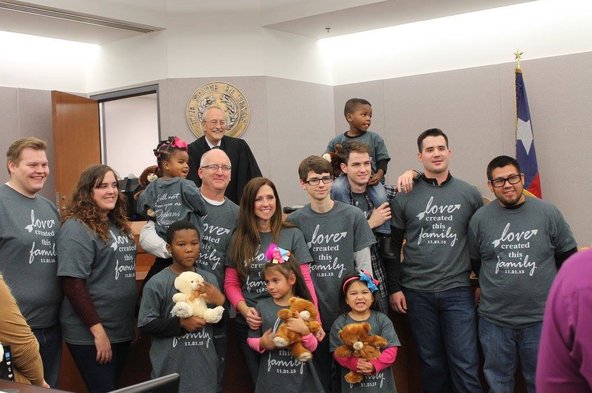
Members of Diane Stanley’s family gathered in the courtroom on the day the five youngest children were adopted.Credit
Diane Stanley has seven children in her home: her biological son, Cooper, 18; her foster son, David, 22, who is intellectually disabled; and five younger children whom she and her husband adopted in November 2015. Those five include the biological siblings Demetries, 8; Caleb, 4; and Maya, 2; as well as the biological sisters Julianna, 7, and Juliette, 6. She is also the mother of two adult children and the stepmother to two adult children, and she has one stepdaughter, 14, who lives with her mother.
Her husband, Jeff, is a pastor. Diane runs a seasonal mobile business called Sno-To-Go, selling shaved ice, and plans to open a stand-alone store this March. They live in Texas. There are 12 kids total in the family, and the Stanleys are expecting to become grandparents soon. Here’s how they do it:
We were planning to take a break from taking any additional foster child placements. My father had cancer. We’d had a rough year.
But then I got the call about a little baby girl, and I looked at my husband and said, “O.K., babe, come on.” He agreed— and as we were driving home to get some things ready, they called and said, Actually, we don’t know that you’re going to want to do this, because she’s got two brothers.
And I asked, Well, where would they go? They said they had nowhere else for them to go — they’ll have to go to a group home or a shelter. Just bring them, I said, we’ll figure it out. My husband was looking over at me, only able to hear my side of the call, and he was just wondering what was going to happen next.
They came to our home with almost nothing: three diapers, no formula. They each had one change of clothes, which were all too small. Maya was 5 months old, Caleb was 19 months and Demetries was 6 years old. They were with us for about a year, and then their mother lost her parental rights.
Then we got a call about two little girls who had been in the foster system for about three years, moving around a lot. They were looking for a forever home for them. Would we be interested?
We formally adopted all five of them in November 2015. So, we have three in elementary school and one in preschool, and the youngest is about to turn 3, and she attends a daycare-type preschool, as well.
We are definitely starting over. We actually have a grandchild on the way.
We get up very early, about 6:15 a.m. We start getting breakfast and lunches going, then we start getting kids ready. Generally Jeff will do the boys and I will do the girls, but Caleb wasn’t feeling well yesterday, so I was with him.
One challenge has been learning to do African-American hair and skin care. Yesterday, they just wore headbands, because that’s all my husband can do. He gave cereal to the four younger ones that were going to school and sat down with them, and with David. Cooper skipped breakfast. He’s a junior in high school. He doesn’t do breakfast on school days.
Cooper drives David to Bridges, a “dayhab” center that provides occupational and educational services to children and adults with disabilities, before he goes to school. They left first, then my husband was just leaving, but he and Julianna could not find the jacket she wanted to wear.
I try to be very organized and put the kids’ shoes and coat in a certain place, but this just wasn’t there. The search was on. We could not find her jacket, and she didn’t want any other jacket, it had to be this jacket, and with these little ones, you just don’t push that. They need to feel like they can count on things, even if it’s something as small as a jacket.
Finally, I said, “Maya, have you seen her jacket?” Maya got this little 2-year-old grin, and she opened the door of the dryer, and there it was.
It could stress you out, or you could just look at it and laugh.
So Jeff got them out the door, and I kept Caleb home with me. He normally goes to prekindergarten. They left at 7:25. My husband usually does all the drop-offs before driving back home before work, so he leaves me the big Chevy Suburban and takes the little car.
I had errands to run, and Caleb had to go with me. I told him he could be my helper at the grocery store, and he lit up. He did great. I think it helps when they each get to have an outing one-on-one with a parent.
When we got home he helped me put some of the groceries away, and then he lay down for a nap. I immediately started dividing everything else up, packaging some for meals and putting some in the freezer for the following week.
At 2:30 p.m. I woke Caleb, and we got into the car to get the girls from school. The day before I’d had to pick them up early for an appointment. The kids all have a lot of needs. It seems like almost every day it’s something — an appointment or someone is sick. It’s pretty rare for me to feel like it’s an ordinary day.
We have spent a lot of time at the Children’s Health Rees-Jones Center for Foster Care Excellence in Dallas, which is just for children in foster care. It has truly been a life-saver for us. Many times, we have been at a complete loss over how to handle some of the emotional and behavioral issues with our children, and the doctors and nurses at the center have gone the extra mile to help us with suggestions, referrals to specialists and solutions to our problems. Now that the kids are adopted, we are transitioning away from there. I miss it — we all do.
When they were our foster children, we received a monthly check, health insurance and help with summer camps and activities. Now that the kids are adopted, they don’t get very much financial help. But we’re digging into our retirement and opening another business. They’re ours. We love them.
The money had no bearing on our decision. It turned out that because they were considered “hard to place” children, there is still a small stipend. The amount of aid has gone down $40,000 a year because we adopted them. They still have health insurance, but it has been downgraded to a state plan that doesn’t cover as much.
After we picked up the girls, I brought them home for a snack. They worked on homework. They have reading homework and some written homework every night — maybe a worksheet or some math. I sit down with them. I treat it like home-schooling. Demetries is the only one who can do it on his own, and he wasn’t home. He stays after school for an hour every Tuesday for an artist’s club.
Because of what they’ve been through and because it’s all so new, things take longer. Based on their age, you would expect them to have experienced certain things, but they haven’t necessarily. They’ve never had birthday parties. They didn’t have to sit down with homework every night. Julianna and Juliette have been in eight different homes by now. When we have a guest come over, they’ll ask: Are they going to take us away?
They’re happy and excited to have permanency, but they don’t really grasp it. We are in teaching mode with everything. It can be draining. It takes a lot of patience, and I fail sometimes. I lose my patience and get a little flustered, but then I stop and take a step back. It’s not just one day at a time, it’s one minute at a time around here.
After homework, the kids played outside for a while, then we loaded back into the car to go pick up Demetries, and immediately had to rush elsewhere because Julianna and Demetries are going to be munchkins in the coming “The Wizard of Oz” play at the high school. It was a two-hour practice, and I brought coloring books and a tablet for Juliette and Caleb.
When we came home, Demetries did homework at the table while I was starting dinner. Jeff got Maya. We had dinner. It was a really uneventful night: no major fits, no one getting in trouble or acting out. When I say uneventful, that means no major knock-down, drag-out fights. Just normal stuff.
The older boys had to work. David is a bagger at Brookshire’s grocery store; Cooper works at a fast-food restaurant, Chicken Express. Cooper is a big help with David — he’s a big help with all of the kids. Early on, it was a hard transition, but he has seen how needed it is, and how many kids need a mom and a dad in the world. He has kind of embraced it now.
We come together with the younger children and have family time before bedtime. We pray and do a bedtime story and talk to them about their day, as well as the next day and what the plans for the week are.
Things go much more smoothly if they know what to expect the next day. Julianna will ask me step by step what is going on, questioning about every little detail, even what she’s wearing. I believe it is a result of what’s she’s been through. She doesn’t want any surprises. I asked her nurse practitioner at the Rees-Jones Center about it, and she told me to keep helping Julianna know what the plan is, even for minor things. That’s part of why she really wanted her jacket in the morning.
So many foster kids have had so little control over their lives. They’re told where to live and when to leave, what kind of toothpaste they can use, what bowl they get. I try to give them choices so they can feel in control of those, and not do the negative things that have been all they can control up to now.
Once the kids are in bed, I prepare their snack for tomorrow and retrieve all the lunch stuff. The two little ones don’t have to take lunch, so I’m only doing five lunches a day. I’ve told Cooper and David that, since they help me so much with everything else, I’ll still make their lunches for them. They got lucky.
David got off at 9 p.m., so my husband picked him up. Cooper didn’t get off until 11. Our gas bill is almost as high as our grocery bill! And we haven’t even started basketball yet, and the girls will start dance too. There is a lot more ahead.
We don’t get out much. We don’t have any babysitting. It’s not easy to leave them. When they were in state custody we couldn’t — every caregiver has to be licensed by the state. After we adopted them, we could decide, but we still can’t just hire any teenager — and I don’t want to put that all on Cooper.
We’ve had one date night, because a young woman who works at the daycare was available. Any time we can get her, we snap her up.
We’re getting into a routine. Things are going more smoothly every day. It’s a lot, but we can handle it — although more date nights might help.
How I Do It is an occasional series dedicated to telling the stories of how parents get through the long days and the short years. For more How I Do It, read: Terran Lyons, McDonald’s Crew Trainer, on Raising 2 on the Minimum Wage; How Tracy Mack-Askew, Chevrolet Vehicle Line Manager, Does It; How Kai Ryssdal, Radio Host, Does It and How Nicole Zeitzer Johnson, Communications Director and Special Needs Parent, Does It.







